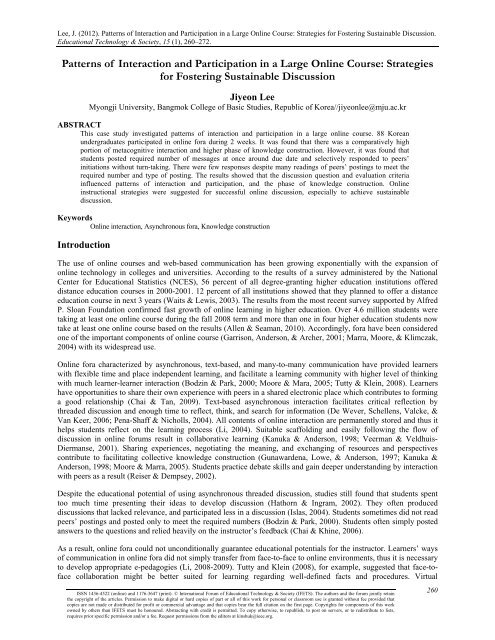January 2012 Volume 15 Number 1 - Educational Technology ...
January 2012 Volume 15 Number 1 - Educational Technology ...
January 2012 Volume 15 Number 1 - Educational Technology ...
You also want an ePaper? Increase the reach of your titles
YUMPU automatically turns print PDFs into web optimized ePapers that Google loves.
Lee, J. (<strong>2012</strong>). Patterns of Interaction and Participation in a Large Online Course: Strategies for Fostering Sustainable Discussion.<br />
<strong>Educational</strong> <strong>Technology</strong> & Society, <strong>15</strong> (1), 260–272.<br />
Patterns of Interaction and Participation in a Large Online Course: Strategies<br />
for Fostering Sustainable Discussion<br />
Jiyeon Lee<br />
Myongji University, Bangmok College of Basic Studies, Republic of Korea//jiyeonlee@mju.ac.kr<br />
ABSTRACT<br />
This case study investigated patterns of interaction and participation in a large online course. 88 Korean<br />
undergraduates participated in online fora during 2 weeks. It was found that there was a comparatively high<br />
portion of metacognitive interaction and higher phase of knowledge construction. However, it was found that<br />
students posted required number of messages at once around due date and selectively responded to peers’<br />
initiations without turn-taking. There were few responses despite many readings of peers’ postings to meet the<br />
required number and type of posting. The results showed that the discussion question and evaluation criteria<br />
influenced patterns of interaction and participation, and the phase of knowledge construction. Online<br />
instructional strategies were suggested for successful online discussion, especially to achieve sustainable<br />
discussion.<br />
Keywords<br />
Online interaction, Asynchronous fora, Knowledge construction<br />
Introduction<br />
The use of online courses and web-based communication has been growing exponentially with the expansion of<br />
online technology in colleges and universities. According to the results of a survey administered by the National<br />
Center for <strong>Educational</strong> Statistics (NCES), 56 percent of all degree-granting higher education institutions offered<br />
distance education courses in 2000-2001. 12 percent of all institutions showed that they planned to offer a distance<br />
education course in next 3 years (Waits & Lewis, 2003). The results from the most recent survey supported by Alfred<br />
P. Sloan Foundation confirmed fast growth of online learning in higher education. Over 4.6 million students were<br />
taking at least one online course during the fall 2008 term and more than one in four higher education students now<br />
take at least one online course based on the results (Allen & Seaman, 2010). Accordingly, fora have been considered<br />
one of the important components of online course (Garrison, Anderson, & Archer, 2001; Marra, Moore, & Klimczak,<br />
2004) with its widespread use.<br />
Online fora characterized by asynchronous, text-based, and many-to-many communication have provided learners<br />
with flexible time and place independent learning, and facilitate a learning community with higher level of thinking<br />
with much learner-learner interaction (Bodzin & Park, 2000; Moore & Mara, 2005; Tutty & Klein, 2008). Learners<br />
have opportunities to share their own experience with peers in a shared electronic place which contributes to forming<br />
a good relationship (Chai & Tan, 2009). Text-based asynchronous interaction facilitates critical reflection by<br />
threaded discussion and enough time to reflect, think, and search for information (De Wever, Schellens, Valcke, &<br />
Van Keer, 2006; Pena-Shaff & Nicholls, 2004). All contents of online interaction are permanently stored and thus it<br />
helps students reflect on the learning process (Li, 2004). Suitable scaffolding and easily following the flow of<br />
discussion in online forums result in collaborative learning (Kanuka & Anderson, 1998; Veerman & Veldhuis-<br />
Diermanse, 2001). Sharing experiences, negotiating the meaning, and exchanging of resources and perspectives<br />
contribute to facilitating collective knowledge construction (Gunawardena, Lowe, & Anderson, 1997; Kanuka &<br />
Anderson, 1998; Moore & Marra, 2005). Students practice debate skills and gain deeper understanding by interaction<br />
with peers as a result (Reiser & Dempsey, 2002).<br />
Despite the educational potential of using asynchronous threaded discussion, studies still found that students spent<br />
too much time presenting their ideas to develop discussion (Hathorn & Ingram, 2002). They often produced<br />
discussions that lacked relevance, and participated less in a discussion (Islas, 2004). Students sometimes did not read<br />
peers’ postings and posted only to meet the required numbers (Bodzin & Park, 2000). Students often simply posted<br />
answers to the questions and relied heavily on the instructor’s feedback (Chai & Khine, 2006).<br />
As a result, online fora could not unconditionally guarantee educational potentials for the instructor. Learners’ ways<br />
of communication in online fora did not simply transfer from face-to-face to online environments, thus it is necessary<br />
to develop appropriate e-pedagogies (Li, 2008-2009). Tutty and Klein (2008), for example, suggested that face-toface<br />
collaboration might be better suited for learning regarding well-defined facts and procedures. Virtual<br />
ISSN 1436-4522 (online) and 1176-3647 (print). © International Forum of <strong>Educational</strong> <strong>Technology</strong> & Society (IFETS). The authors and the forum jointly retain<br />
the copyright of the articles. Permission to make digital or hard copies of part or all of this work for personal or classroom use is granted without fee provided that<br />
copies are not made or distributed for profit or commercial advantage and that copies bear the full citation on the first page. Copyrights for components of this work<br />
owned by others than IFETS must be honoured. Abstracting with credit is permitted. To copy otherwise, to republish, to post on servers, or to redistribute to lists,<br />
requires prior specific permission and/or a fee. Request permissions from the editors at kinshuk@ieee.org.<br />
260

















